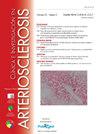Quilomicronemia familiar: nuevas perspectivas
IF 1.9
Q3 PERIPHERAL VASCULAR DISEASE
引用次数: 0
Abstract
Familial chylomicronemia syndrome (FCS) is a very rare, underdiagnosed disorder that can cause abdominal pain and recurrent pancreatitis from childhood —potentially life-threatening— and chronic complications such as diabetes mellitus and exocrine pancreatic insufficiency. FCS affects the quality of life and mental health of those who suffer from it, aspects that must be taken into account in its treatment, based on a strict low-fat diet, which is difficult to adhere to and persist. People with FCS lack the lipolytic capacity to hydrolyze triglycerides (TG) and have a minimal or null response to conventional lipid-lowering treatments. ApoCIII antagonists, specifically volanesorsen, olezarsen and ARO-APOC3, are the most promising drugs to reduce TG concentrations in patients with FCS. Anti-ANGPTL3 therapies appear to be less effective. More clinical trials and new pharmacological treatments are needed to improve the quality of life and prognosis of people with FCS.
家族性乳糜微粒血症:新观点。
家族性乳糜小量血症综合征(FCS)是一种非常罕见的未确诊疾病,可引起腹痛和儿童期复发性胰腺炎(可能危及生命)以及慢性并发症,如糖尿病和外分泌胰腺功能不全。FCS影响患者的生活质量和心理健康,在治疗时必须考虑到这些方面,治疗的基础是严格的低脂饮食,这种饮食很难坚持和坚持。FCS患者缺乏水解甘油三酯(TG)的解脂能力,对常规降脂治疗反应极小或无效。ApoCIII拮抗剂,特别是volanesorsen, olezarsen和ARO-APOC3,是最有希望降低FCS患者TG浓度的药物。抗angptl3治疗似乎效果较差。需要更多的临床试验和新的药物治疗来改善FCS患者的生活质量和预后。
本文章由计算机程序翻译,如有差异,请以英文原文为准。
求助全文
约1分钟内获得全文
求助全文
来源期刊

Clinica e Investigacion en Arteriosclerosis
PERIPHERAL VASCULAR DISEASE-
CiteScore
3.20
自引率
6.20%
发文量
44
审稿时长
40 days
期刊介绍:
La publicación idónea para acceder tanto a los últimos originales de investigación como a formación médica continuada sobre la arteriosclerosis y su etiología, epidemiología, fisiopatología, diagnóstico y tratamiento. Además, es la publicación oficial de la Sociedad Española de Arteriosclerosis.
 求助内容:
求助内容: 应助结果提醒方式:
应助结果提醒方式:


